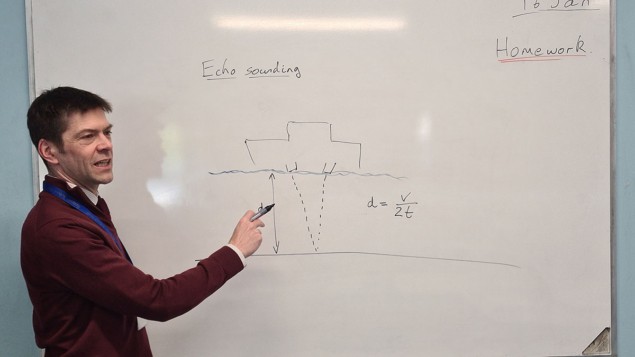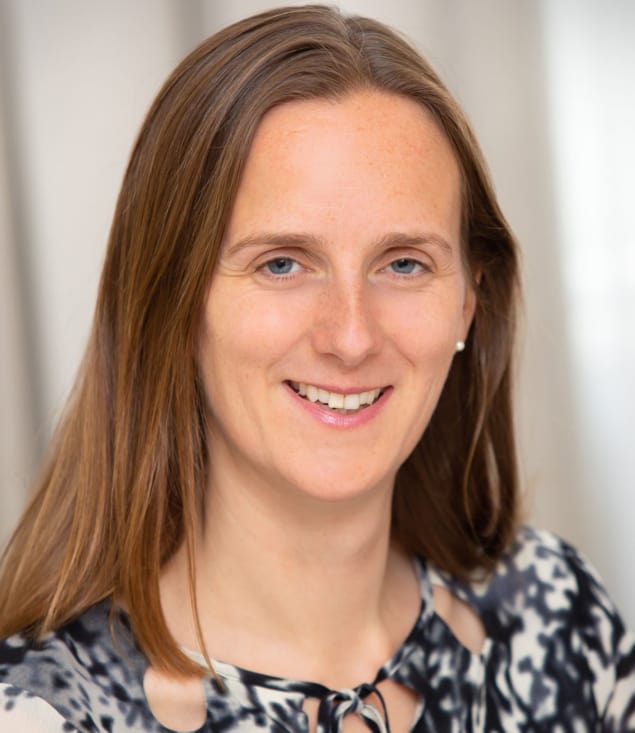It’s not just recent graduates who are eligible for the IOP’s Teacher Training Scholarship programme. This attractive route into physics teaching is open to mid-career scientists, engineers and specialists from a range of industries

While recruitment and retention of specialist physics teachers remains a long-standing problem in England – where national supply consistently falls short of demand – an equally worrying trend is the fact that state schools are far more likely than private schools to say they’re understaffed for physics teachers. That’s one of the key take-aways from The Science Teaching Survey 2023, a recently published poll of 2932 teachers (including 1735 physics teachers), heads of department and technicians, conducted by the Royal Society of Chemistry in partnership with the Institute of Physics (IOP) and the Royal Society of Biology. Drill into the data and it’s clear the problems are especially acute in England, where 50% of respondents working in mainstream schools report a shortage of physics teachers (versus 22% of teachers in private schools flagging the same issue).
As part of its strategy to address the shortage of candidates for initial teacher training (ITT) programmes in physics, the IOP, which publishes Physics World, is aiming to encourage talented graduates and postgraduates in physics and other related disciplines to enter the teaching profession via its Teacher Training Scholarship scheme. Funded by the Department for Education (DfE), the scholarships represent a compelling proposition to help would-be teachers transition through their one-year ITT course in England.
Support is substantial, broad-scope and sustained. The IOP’s 2024/25 scholarship scheme, for example, is now open for applications and has 175 scholarships to award to the next ITT cohort. Successful candidates will each benefit from tax-free funding of £30,000, with payment being phased throughout the training year and reinforced by a structured programme of continuing professional development (CPD) and skilled mentoring support to complement trainees’ core ITT learning.
From finance into teaching
In this way, the IOP scholarship programme provides an accessible route into physics teaching for recent graduates as well as mid-career scientists and engineers working across a range of industries. A case in point is Mark Owens, an IOP Teacher Training Scholar who completed his ITT course in summer 2023 ahead of taking up a full-time physics teaching post last September.
Owens graduated in physics from Durham University in 1995 and, while tempted at the time by the prospect of a PhD in neutrino studies, he opted instead for an industry pathway, securing a place on Unilever’s prestigious management training programme. From there, Owens spent the next 25 years working across senior strategy and finance roles in diverse business settings, including a decade as chief financial officer and adviser for a series of technology start-up ventures.
It was in 2018, however, as his interest in business started to wane a little, that Owens reignited his passion for physics, signing up as a volunteer tutor through the Access Project to provide online teaching and mentoring to talented A-level physics students from disadvantaged backgrounds. “I like change and I’m always seeking fresh challenges,” says Owens. “I found that I really enjoyed sharing my knowledge of physics with young people – though it also became clear to me that I wanted to scale up beyond those one-to-one interactions and make the move into teaching full-time.”
For Owens, and other career-changers like him, it’s evident that the journey from the commercial world back into the classroom would be that much harder – if not impossible – without access to the IOP Teacher Training Scholarship scheme. “I was earning good money in industry at the time,” notes Owens, “so I couldn’t have made the transition without the financial ‘bridge’ provided by the IOP scholarship funding.”
With a scholarship in place, Owens’ route into teaching involved a one-year, school-centred ITT (SCITT) programme that saw him, from the off, working in the classroom with Key Stage 3 and Key Stage 4 students (ages 11–16) for four days every week. The remainder of his time was spent with other trainee teachers – from a range of subject backgrounds – learning the fundamentals of teaching.
“Our vocational training was centred on best practice in the classroom,” Owens explains. “Essentially getting the basics in place: how to manage a class of 30 students who are all at different stages; how to put together a lesson plan that makes sense; how to assess the students well; and, crucially, how to deal with difficult behaviours – one of biggest challenges when you’re used to the adult business environment.”
The core teacher training from his ITT provider (i2i Teaching Partnership) was reinforced by a dedicated series of CPD online workshops and webinars within the IOP scholarship programme. Owens also attended the annual Masterclass of IOP Teacher Training Scholars at the National Space Centre in Leicester – an opportunity to network with peers from his cohort as well as several alumni. “The IOP training events are rich, granular and tailored to trainee teachers who already understand the subject,” he notes. “There’s a focus on areas of physics that school students typically get wrong and breaking down the barriers to a deeper understanding.”
From the law into physics
Louisa Passmore was part of the same IOP scholarship intake as Owens, though perhaps a more atypical mid-career professional making the move into physics teaching. After a law degree at the University of Oxford, Passmore spent 20 years working as a corporate lawyer for leading City firms – all the while maintaining a deep interest in science after studying physics and maths at A-level.

The COVID pandemic and the multiple lockdowns enabled Passmore, like plenty of others, to reassess her chosen career arc and a possible pathway into teaching – and physics teaching specifically. “Before the pandemic,” she explains, “I’d starting leading Brownie and Ranger groups in the Girl Guides and enjoyed all the training, development and mentoring work with young people. Teaching seemed like a logical progression, though it wasn’t clear to me if there was a route into physics teaching without a physics degree.”
Turns out there was – with a lot of hard graft along the way. First up, Passmore “hit the textbooks” to re-engage with a subject she’d last studied formally in sixth form. Other learning and development activities included a 20-week subject-knowledge enhancement course (funded by the DfE) and a week-long, hands-on training course in the physics laboratory at Charterhouse School, Surrey. This annual training event sees experienced physics teachers deliver a programme of talks and supervised experimental work covering the basics of Key Stage 3 upwards.
The final piece of the jigsaw? A conversation with the IOP Learning and Skills team to explore – and ultimately confirm – Passmore’s eligibility for an IOP Teacher Training Scholarship. “The resources are out there,” she explains, “you just have to keep knocking on doors. So many experienced and talented people have supported me in getting this far. There’s a real desire to help career-changers make a successful transition into teaching.”
Right now, after splitting her training part-time across two years, Passmore has another six months of ITT with the National Maths and Physics SCITT before she qualifies as a physics teacher. “From an academic perspective,” she notes, “I’ve been surprised at all the transferable skills from the practice of law into the physics classroom – not least, logical thinking, attention to detail, perseverance and relating theory to the real world.”
There’s also the life experience that Passmore, as a career-changer, can share with her pupils. “I tell my students to work hard towards their goals and, most important of all, to enjoy the journey,” she says. “It’s OK to pivot and take new directions as well. What path you decide to follow at 18 or 21 isn’t necessarily the same one you’ll be on when you hit 50 or 60.”
- SEO Powered Content & PR Distribution. Get Amplified Today.
- PlatoData.Network Vertical Generative Ai. Empower Yourself. Access Here.
- PlatoAiStream. Web3 Intelligence. Knowledge Amplified. Access Here.
- PlatoESG. Carbon, CleanTech, Energy, Environment, Solar, Waste Management. Access Here.
- PlatoHealth. Biotech and Clinical Trials Intelligence. Access Here.
- Source: https://physicsworld.com/a/iop-teacher-training-scholarships-opening-up-new-opportunities-whatever-your-background/



